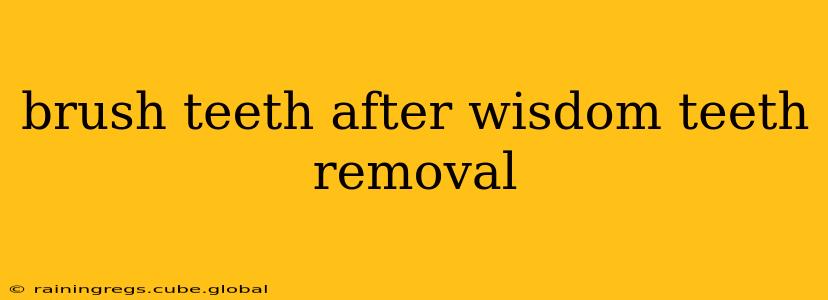Wisdom teeth removal is a common procedure, but knowing how to care for your mouth afterward is crucial for a smooth recovery. One of the most frequently asked questions revolves around brushing your teeth. This comprehensive guide will answer all your questions and help you navigate this important post-operative phase.
When Can I Brush My Teeth After Wisdom Teeth Removal?
This is a key question, and the answer depends on the specifics of your surgery. Immediately after the procedure, your surgeon will likely pack the extraction sites with gauze to control bleeding. You should avoid brushing directly over the extraction sites for at least 24 hours. This waiting period allows blood clots to form, essential for healing and preventing dry socket (a painful complication).
However, you can gently brush the rest of your teeth. Focus on areas away from the surgical sites, using a soft-bristled toothbrush and gentle circular motions. This helps prevent infection and maintains good oral hygiene in unaffected areas.
How Should I Brush My Teeth After Wisdom Teeth Removal?
Once the 24-hour period has passed, you can begin to gently brush around the extraction sites. Remember, gentle is key. Avoid any harsh scrubbing or aggressive brushing that could dislodge the blood clots.
Here's a step-by-step guide:
- Use a soft-bristled toothbrush: Hard bristles can irritate the sensitive gums and extraction sites.
- Use lukewarm water: Avoid hot or cold water, as these can cause discomfort.
- Gentle circular motions: Brush gently in small circular motions, focusing on cleaning the teeth without disturbing the healing sites.
- Rinse gently: After brushing, rinse your mouth gently with saltwater (1/4 teaspoon salt dissolved in 8 ounces of warm water). Avoid forceful rinsing or spitting, which could dislodge blood clots.
- Avoid the extraction sites directly: Focus your brushing on the surrounding areas. As the healing progresses, you can gradually increase brushing around the extraction sites, always maintaining a gentle approach.
What if I Get a Dry Socket?
Dry socket is a painful condition that can occur when the blood clot at the extraction site becomes dislodged. Symptoms include intense pain, a bad taste in your mouth, and sometimes a visible empty socket. If you suspect you have a dry socket, contact your oral surgeon or dentist immediately. They can provide pain relief and address the problem.
What Type of Toothbrush Should I Use After Wisdom Teeth Removal?
Using a soft-bristled toothbrush is paramount after wisdom teeth extraction. Avoid medium or hard-bristled brushes, as they can damage the healing tissue and increase the risk of dry socket or infection. An electric toothbrush on a gentle setting can be an option, but always exercise caution and avoid direct contact with the extraction sites.
Can I Use Mouthwash After Wisdom Teeth Removal?
Using a mouthwash is generally discouraged immediately after wisdom teeth removal, particularly antiseptic or alcohol-based mouthwashes, as these can irritate the healing tissues. However, after the initial 24-hour period, your dentist or oral surgeon might recommend a gentle, alcohol-free mouthwash to help with cleaning and preventing infection. Always follow their specific instructions. Plain salt water rinses are generally safe and effective.
How Long Does it Take to Fully Heal After Wisdom Teeth Removal?
The healing process varies depending on individual factors and the complexity of the surgery. Full healing can take several weeks or even months, but the most significant improvement is usually seen within the first few days. During this time, maintaining good oral hygiene, following your surgeon's instructions, and attending follow-up appointments are crucial.
This guide provides general advice. Always follow your oral surgeon's specific post-operative instructions, as they are tailored to your individual case and may differ slightly from these recommendations. If you have any concerns or questions, don't hesitate to contact your dentist or oral surgeon. Remember, proper post-operative care is vital for a successful recovery and healthy smile.
